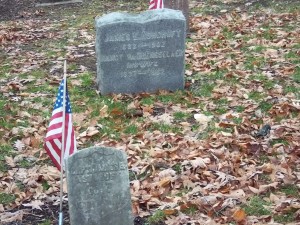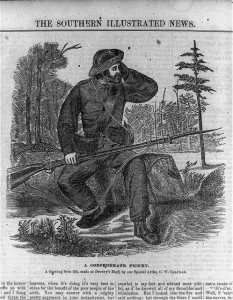January 1862 was very cold. The 19th NY Volunteer Infantry suffered on its march from Frederick to Hancock, Md. Here a Seneca County newspaper paraphrases a letter from James Ashcroft, the captain of the 19th’s Company C. Ashcroft or the editors rather euphemistically describe the freezing march as “extraordinary”. Also, picket duty was undoubtedly freezing, but there were good reasons not to light a warming fire.
From a Seneca County, New York newspaper in February 1862:
From Capt. Ashcroft.
Capt. ASHCROFT writes us from Hancock, Md., under date of Jan. 23d. He says the 3d Brigade, Gen. Williams, is quartered in that village. The Federal pickets are on the North side and the Rebels are on the south side of the Potomac. Five hundred Virginia militia are at Bath, six miles distant, and this is the nearest the enemy approach in force. One of the Federal pickets was shot a few nights since; contrary to orders he built a fire, and suffered the consequences. Capt. Ashcroft says, our march from Frederick to Hancock was considered extraordinary; may the Nineteenth never be tried so severely again. Nothing of interest occurs at this point, and the telegraph will inform you that “all is quiet on the Upper Potomac.”
I know I’m probably being silly, but I keep asking myself: was the picket shot by rebels across the Potomac or by federal authorities maintaining discipline?
Before the war James Ashcroft, a dentist, “commanded a celebrated independent Zouave organization in [Seneca Falls], of such remarkable proficiency in the light infantry tactics, that it was accustomed to give public exhibitions of its skill.” [1] (And the newspaper clippings from 1860 and 1861 in the Seneca Falls library support this statement) Immediately after Fort Sumter he raised a company for the 19th.
___________________________________________
Apparently there weren’t many blogging platforms available during the Civil war years. So far I’ve seen many examples of poems individuals submit to their local newspapers. The poems seem to be good outlets for people’s creativity and a good way for people to support ideas they are passionate about. In this poem a southerner is grateful for the rebel pickets.
From the Richmond Daily Dispatch January 21, 1862:
The Sentinel.
When the curtains are drawn, and the candles are lit,
And easy and warm by the fire-side I sit,
My thoughts wander off from the thames [themes?]I like most
To the cold, lonely sentinel on his dark post.
When cold blows the wintry wind ever the plain,
And cheerlessly driveth the philos rain,
I start from my warm bed and pillow of down
To think of the sentinel walking his round.
For faithful he stands, in the sunshine or storm,
Through the darkness of night, in the brightness of moon;
All unsheltered from wind, or from rain, or from snow,
In silence and solitudes watching the foe.
And though marshalled strong in embattled array,
Our foes wait the moment to spring on their prey,
Yet our army and nation may sleep without fear,
For his signal will warn when their cohorts draw near.
Ere again unto slumber my eyelids are given,
My heart and my lips frame petitions to Heaven,
That the angels of God might the sentinel keep
Who painfully watches while we sweetly sleep.
O. Thou. whom the winds and the waters obey,”
I pray, “full the storm, drive the dark clouds away.
And to brighten his watch, and his lone hours beguite [beguile?],
Send the stars with their light and the moon with her smile.”
“And his spirit to cheer, and his become to warm,
Give him memories dear, and sweet thoughts of home;
And may hope paint the future in colors so bight
As to lighten about him the darkness of night.”
Hanover county, Va, Jan. 1, 1862.
_______________________________
- [1]Cayuga in the Field, Henry Hall, James Hall, Auburn, NY,1873 p.20 ↩


